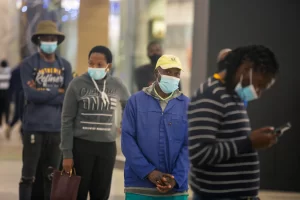Why is the Omicron variant Dangerous?
The Omicron variant (originally identified as B.1.1.529) has a large number of mutations and early research suggests this could cause an increased risk of reinfection, according to the WHO.
This would mean that the variant could cause recoverees of Covid-19 to become infected again and that vaccines could be less effective overall.

Where did the Omicron variant come from?
The first confirmed case of Omicron was detected on 9 November in South Africa, and the variant was reported to the WHO on 24 November.
Experts, meanwhile fear that the sharp upswing of Covid cases in South Africa’s Gauteng province — where the heavily mutated strain of the virus was first identified — could mean it has greater potential to escape prior immunity than other variants.
South Africa has seen three main spikes of Covid-19, most recently with the Delta variant, but the number of new cases suggests that Omicron could cause another spike.
The country’s 7-day average on 26 November was 3,459 compared to 417 a week earlier.
What is the UK doing to stop it?
Six countries have been put on the UK’s red list for travel: South Africa, Botswana, Namibia, Zimbabwe, Lesotho, and Eswatini. Travel from these countries is temporarily banned and all UK travelers returning from one will be asked to quarantine for ten days.
Attendees of England’s rugby game against South Africa last week are also being urged to come forward and be tested.
The Omicron variant has already reached Europe, with Belgium reporting its first case late on Friday. Confirmed cases of Omicron have also been found in Hong Kong, Israel, and Botswana.
The EU and the United States have also imposed a travel ban on the six countries, with the US adding Mozambique and Malawi to the list.
RECOMMENDED ARTICLEs


